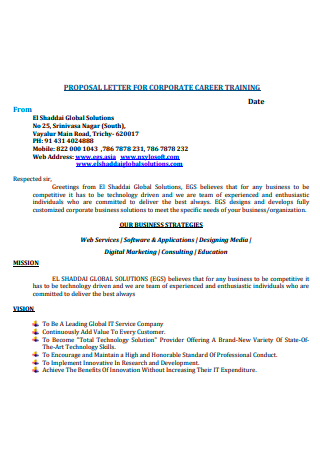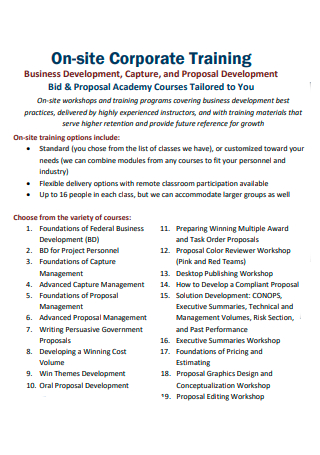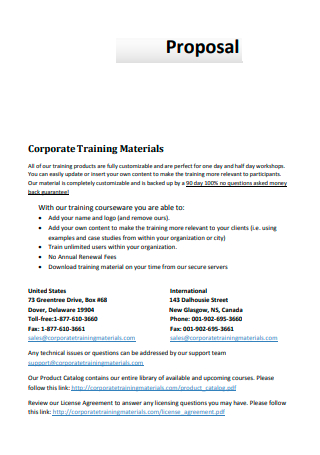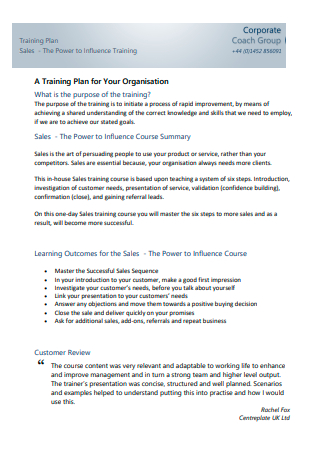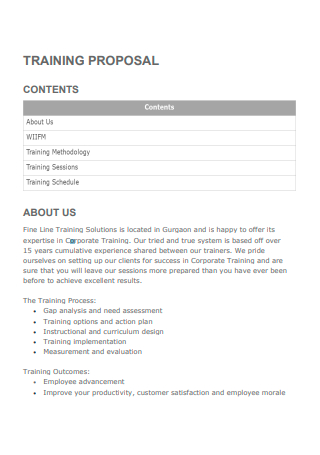4+ Sample Corporate Training Proposal
FREE Corporate Training Proposal s to Download
4+ Sample Corporate Training Proposal
What Is a Corporate Training Proposal?
Benefits of Corporate Training
Suggested Corporate Training Programs
How to Write a Corporate Training Proposal
FAQs
How long should corporate training last?
How much should you spend on worker training?
How long should a training proposal be?
What Is a Corporate Training Proposal?
A corporate training proposal is a document prepared by a company that offers career development and corporate training. Its purpose is to persuade potential clients and employed personnel to enroll in training sessions to enhance their skill set. As such, the employee’s eligibility to undergo training, the projected length of the course, learning objectives, the agenda, and the tentative budget should all be included in your proposal. If you are new to it and require additional aid in preparing a proposal, then you can look into the training proposal sample provided and more specifically a corporate training proposal sample available. Keep on reading.
Benefits of Corporate Training
Corporate training has numerous advantages for both the employer and the personnel. Among the most important advantages of a company, training is that it helps young people develop into tomorrow’s leaders. It also helps to boost employee happiness and decrease turnover. Corporate management training programs assist professionals in spotting talent and understanding their demands, filling the company’s human resource needs, and providing staff with the appropriate talent management training program. If your company is not fully convinced to implement a program for corporate training, then use the factors found in this list to persuade them of the benefits.
Suggested Corporate Training Programs
Any business that invests in its employees’ development is investing in its success. By providing ongoing training for your employees, you can create a work environment that is adaptive, versatile, and ready for change. Employees are increasingly looking for training that is both relevant and valuable to them as professionals and experts. Providing this training is a critical component of developing a true employee experience management plan. While there are several training programs available, a few key courses are critical to your employees’ professional success and can also be beneficial in a personal capacity.
How to Write a Corporate Training Proposal
In any industry, employee training is a vital factor in having a profitable company. Employees must keep their skills up to date, acquire new knowledge, and comprehend new parts of the company regularly. A corporate training proposal must be reviewed before an organization agrees to conduct worker training. A proposal for corporate training can help you get started, whether you are part of an external group providing training to a client or striving to build training in your own company. You can use the corporate training proposal format provided within this article as well as check out the proposal training program example available.
Step 1: State the Goals of the Training
A training proposal can help a corporation decide whether to invest in a corporate training program or not. When developing a corporate training proposal, begin by stating the course’s objectives. If a company considers training for new software, one of its primary goals may be to improve the efficiency of its internal processes. Relate the aim to the operations of the company, not the training topic. Discuss your experience as a trainer and how you might assist the organization in achieving its objectives.
Step 2: Prioritize the Company’s Advantages
It’s vital to focus on the advantages to the organization rather than the elements of the training when preparing a proposal for executing a corporate training program. Remember that corporate training programs can be expensive for a company, so it’s important to make sure they will pay off. As a result, you must link the training’s advantages to business benefits. When explaining your corporate training in your proposal, mention how it will impact the company after it is implemented. It is best to keep in mind the benefits that could contribute to the company upon the completion of the corporate training.
Step 3: Include a Few Training Service Options in Your Proposal
Unless you have a firm grasp of the company’s training budget and resources, it’s a good idea to provide a few training program possibilities. You can offer options that differ in price or duration. As an example, provide a high-cost and low-cost option, or a one-day and three-day training option. You can also demonstrate other training delivery strategies. A pre-recorded video training, for example, may be preferred by the company over a live training event. When you provide your organization options, they can choose the training that is most appropriate for their needs.
Step 4: Offer an Evaluation Plan
It is important to have a means of analyzing the aftermath and effects of corporate training. This is why an evaluation plan should be included in your training proposal. Relate your evaluation reports to the company’s core training aim and the benefits you have stated. If the purpose of operations training was to improve the efficiency of the management team, for example, you can assess the training by focusing on certain procedures before and after the training. Time and how long it takes an employee to create a regular calendar before and after training, for example.
FAQs
How long should corporate training last?
According to Statista, over the last three years, larger corporations in the United States have increased their investment in-company training, with the average number of training hours offered annually per worker increasing from 42.2 in 2017 to 102.6 in 2020. This was the highest average of all organization levels in that year, with small businesses offering 41.7 hours per employee and midsize businesses 34.7 hours. Following the training, tests, and enjoyable quizzes can aid boost knowledge retention. Employees also want to be able to learn new skills and topics regularly.
How much should you spend on worker training?
In 2020, employers spent an average of $1,111 per employee on training, compared to $1,286 per person in 2019. In comparison to large ($924) and small company ($1,678) enterprises, mid-size companies reported the lowest training costs per person of $581. The company must be able to allocate a budget that would suit the specific corporate training needs. You can’t expect to execute IT-focused training and not have the appropriate software, materials, and equipment.
How long should a training proposal be?
The best length for a training proposal is 11 pages and 7 sections, according to various data from millions of proposals. It’s preferable to make your proposal brief and appealing and to include only the most relevant details. The most important thing is that the material reflects the proposal’s primary points. You shouldn’t force to lengthen the document by adding unnecessary information otherwise, it would end up being a waste of time for the reader.
Corporate training is essential for any company because not only are you shaping your employees to perform and excel better in their respective fields. Carrying out a business correspondence training program will not only enhance the good in the employees, but they would also be able to learn what they are not familiar with. This is why preparing and viewing the business training proposal example will help you out as you write your own.

